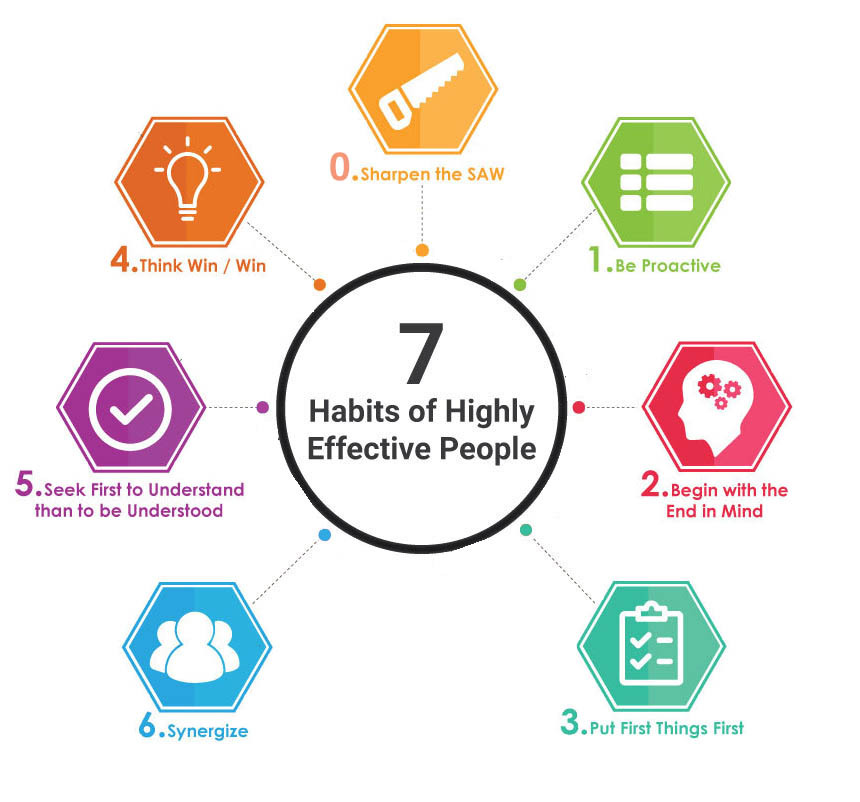The 7 Habits of Highly Effective Teens: A Comprehensive Guide
The 7 Habits In the fast-paced and often tumultuous world of adolescence, young people face a myriad of challenges—from academic pressures and social dynamics to personal identity struggles. Sean Covey’s of Highly Effective Teens” serves as an essential guide for navigating these formative years with confidence and purpose.
This book presents a framework of seven key habits designed to foster personal development, effective communication, and positive relationships. Through relatable anecdotes, practical exercises, and insightful principles, Covey empowers teens to take charge of their lives and build a foundation for lifelong success.
Habit 1: Be Proactive :
The cornerstone of personal effectiveness begins with the first habit: Be Proactive. Covey emphasizes the importance of taking responsibility for one’s life. Being proactive means recognizing that you have the ability to choose your responses to different situations rather than merely reacting based on emotions or external pressures.
Teens are encouraged to assess their “circle of influence,” which includes aspects of their lives that they can change or affect.
By fostering a proactive mindset, teens can cultivate resilience and a sense of agency. They learn that their actions have consequences and that they hold the power to shape their futures. This understanding not only builds self-confidence but also empowers them to confront challenges head-on, making decisions that align with their values and goals.
Habit 2: Begin with the End in Mind
The second habit, Begin with the End in Mind, highlights the significance of having a clear vision for the future. Covey encourages teens to define their personal values and long-term goals. He suggests that young people create personal mission statements that articulate what they stand for and what they aspire to achieve in life.
Having a well-defined vision allows teens to make informed decisions that align with their aspirations. This habit fosters a sense of purpose, helping them prioritize their activities and maintain focus on what truly matters. By envisioning their future, teens can establish a roadmap that guides their daily actions and helps them stay motivated in the face of obstacles.
Habit 3: Put First Things First
Time management is a critical skill for teens, and the third habit, Put First Things First, addresses this need. Covey introduces the Time Management Matrix, which categorizes tasks into four quadrants based on their urgency and importance.
This framework helps teens differentiate between activities that are truly important for their long-term goals and those that are merely urgent or distracting.
By focusing on Quadrant II activities—those that are important but not urgent—teens can effectively manage their time and reduce stress. This habit encourages discipline and helps teens become proactive planners rather than reactive responders. It instills the value of prioritizing tasks that contribute to their personal growth and future success.
Habit 4: Think Win-Win
In cultivating healthy relationships, Covey introduces the fourth habit: Think Win-Win. This mindset emphasizes seeking mutually beneficial solutions in all interactions. Teens are encouraged to adopt an attitude of collaboration rather than competition, fostering a sense of respect and cooperation with peers, family, and authority figures.
By thinking win-win, teens learn to navigate conflicts and negotiations effectively. This habit builds trust and enhances interpersonal relationships, creating an environment where everyone feels valued and understood. As a result, young people are better equipped to resolve disputes amicably and maintain harmonious relationships.
Habit 5: Seek First to Understand, Then to Be Understood
Effective communication is essential for success, and the fifth habit, Seek First to Understand, Then to Be Understood, focuses on this critical skill. Covey emphasizes the importance of empathetic listening—making a conscious effort to understand others’ perspectives before expressing one’s own thoughts.
By practicing active listening, which includes reflecting back what the speaker has said and asking clarifying questions, teens can enhance their communication skills and build deeper connections with others. This habit fosters trust and mutual respect, making it easier to address conflicts and misunderstandings constructively.
Habit 6: Synergize
The sixth habit, Synergize, underscores the power of teamwork and collaboration. Covey teaches teens that synergy occurs when individuals come together, valuing each other’s strengths and differences to create better solutions than they could achieve alone.
He illustrates this concept with real-life examples that show how diverse perspectives lead to innovative ideas and creative problem-solving.
By learning to embrace collaboration, teens enhance their interpersonal skills and create a supportive network of relationships. This habit teaches them that working together not only enhances individual strengths but also fosters a sense of community and shared achievement.
Habit 7: Sharpen the Saw
The final habit, Sharpen the Saw, emphasizes the importance of self-renewal and balance across four dimensions: physical, social/emotional, mental, and spiritual.
Covey encourages teens to engage in activities that promote well-being in each area. This may include regular exercise, nurturing relationships, continuous learning, and engaging in spiritual or reflective practices.
By prioritizing self-care and growth, teens can maintain balance and resilience. This habit teaches them that personal development is a lifelong journey and that maintaining equilibrium in all aspects of life is crucial for sustained success and happiness.
Conclusion
In summary, offers a robust framework for young people seeking to cultivate effective habits that will serve them throughout their lives.
Covey’s engaging approach helps teens understand the importance of taking responsibility for their choices, setting clear goals, managing their time wisely, and building strong relationships. By adopting these seven habits, adolescents can navigate the complexities of their formative years with greater confidence and purpose.
The principles outlined in this book not only empower teens to become proactive leaders but also encourage them to make positive contributions to their communities.
As they apply these habits, they develop the skills necessary to thrive in an ever-changing world, laying the groundwork for a successful and fulfilling future.
Whether faced with academic pressures, social challenges, or personal growth opportunities, the insights from Covey’s book will resonate with teens, guiding them toward becoming highly effective individuals. PDF


